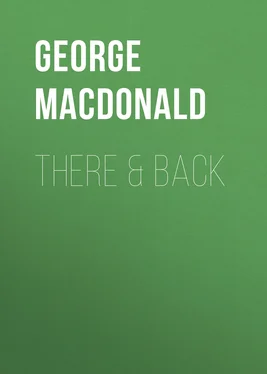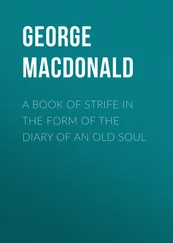George MacDonald - There & Back
Здесь есть возможность читать онлайн «George MacDonald - There & Back» — ознакомительный отрывок электронной книги совершенно бесплатно, а после прочтения отрывка купить полную версию. В некоторых случаях можно слушать аудио, скачать через торрент в формате fb2 и присутствует краткое содержание. Жанр: foreign_prose, foreign_religion, foreign_antique, на английском языке. Описание произведения, (предисловие) а так же отзывы посетителей доступны на портале библиотеки ЛибКат.
- Название:There & Back
- Автор:
- Жанр:
- Год:неизвестен
- ISBN:нет данных
- Рейтинг книги:4 / 5. Голосов: 1
-
Избранное:Добавить в избранное
- Отзывы:
-
Ваша оценка:
- 80
- 1
- 2
- 3
- 4
- 5
There & Back: краткое содержание, описание и аннотация
Предлагаем к чтению аннотацию, описание, краткое содержание или предисловие (зависит от того, что написал сам автор книги «There & Back»). Если вы не нашли необходимую информацию о книге — напишите в комментариях, мы постараемся отыскать её.
There & Back — читать онлайн ознакомительный отрывок
Ниже представлен текст книги, разбитый по страницам. Система сохранения места последней прочитанной страницы, позволяет с удобством читать онлайн бесплатно книгу «There & Back», без необходимости каждый раз заново искать на чём Вы остановились. Поставьте закладку, и сможете в любой момент перейти на страницу, на которой закончили чтение.
Интервал:
Закладка:
“Or the devil!” suggested his father.
Then the woman looked like a tigress. She opened her mouth, but closed it again with a snap.
“I may say what I like of my own!” said the father. “Tell me the goblin is none of mine, and I will be as respectful to him as you please. Prove it, and I will give you fifty pounds. He’s hideous! He’s damnably ugly! Deny it if you can.”
The woman held her peace. She could not, even to herself, call him a child pleasant to look at. She gazed on him for a moment with pitiful, protective eyes, then covered his face as if he were dead, but she did not move.
“Why don’t you go?” said the baronet.
Instead of replying, she began, as by a suddenly confirmed resolve, to remove the coverings at the other end of the bundle, and presently disclosed the baby’s feet. The baronet gazed wondering. To what might not assurance be about to subject him? She took one of the little feet in a hard but gentle hand, and spreading out “the pink, five-beaded baby-toes,” displayed what even the inexperience of the baronet could not but recognize as remarkable: between every pair of toes was stretched a thin delicate membrane. She laid the foot down, took up the other, and showed the same peculiarity. The child was web-footed, as distinctly as any properly constituted duckling! Then she lifted, one after the other, the tiny hands, beautiful to any eye that understood, and showed between the middle and third finger of each, the same sort of membrane rising half-way to the points of them.
“I see!” said the baronet, with a laugh that was not nice, having in it no merriment, “the creature is a monster!—Well, if you think I am to blame, I can only protest you are mistaken. I am not web-footed! The duckness must come from the other side.”
“I hope you will remember, sir Wilton!”
“Remember? What do you mean? Take the monster away.”
The woman rearranged the coverings of the little crooked legs.
“Won’t you look at your lady before they put her in her coffin?” she said when she had done.
“What good would that do her? She’s past caring!—No, I won’t: why should I? Such sights are not pleasant.”
“The coffin’s a lonely chamber, sir Wilton; lonely to lie all day and all night in!”
“No lonelier for one than for another!” he replied, with an involuntary recoil from his own words. For the one thing a man must believe—yet hardly believes—is, that he shall one day die. “She’ll be better without me, anyhow!”
“You are heartless, sir Wilton!”
“Mind your own business. If I choose to be heartless, I may have my reasons. Take the child away.”
Still she did not move. The baby, young as he was, had thrown the blanket from his face, and the father’s eyes were fixed on it: while he gazed the nurse would not stir. He seemed fascinated by its ugliness. Without absolute deformity, the child was indeed as unsightly as infant well could be.
“My God!” he said again—for he had a trick of crying out as if he had a God—“the little brute hates me! Take it away, woman. Take it away before I strangle it! I can’t answer for myself if it keeps on looking at me!”
With a glance whose mingled anger and scorn the father did not see, the nurse turned and went.
He kept staring after her till the door shut, then fell back into his chair, exclaiming once more, “My God!”—What or whom he meant by the word, it were hard to say.
“Is it possible,” he said to himself, “that the fine woman I married—for she was a fine woman, a deuced fine woman!—should have died to present the world with such a travesty! It’s like nothing human! It’s an affront to the family! Ah! the strain will show! They say your sins will find you out! It was a sin to marry the woman! Damned fool I was! But she bewitched me! I was bewitched!—Curse the little monster! I shan’t breathe again till I’m out of the house! Where was the doctor? He ought to have seen to it! Hang it all, I’ll go abroad!”
Ugly as the child was, however, to many an eye the first thing evident in him would have been his strong likeness to his father—whose features were perfect, though at the moment, and at many a moment, their expression was other than attractive. Sir Wilton disliked children, and the dislike was mutual. Never did child run to him; never was child unwilling to leave him. Escaping from his grasp, he would turn and look back, like Christian emerging from the Valley of the Shadow, as if to weigh the peril he had been in.
As tenderly as if he had been the loveliest of God’s children, the woman bore her charge up staircases, and through corridors and passages, to the remote nursery, where, in a cradle whose gay furniture contrasted sadly with the countenance of the child and the fierceness of her own eyes, she gently laid him down. But long after he was asleep, she continued to bend over him, as if with difficulty restraining herself from clasping him again to her bosom.
Jane Tuke had been married four or five years, but had no children, and the lack seemed to have intensified her maternity. Elder sister to lady Lestrange, she had gone gladly to receive her child in her arms, and had watched and waited for it with an expectation far stronger than that of the mother; for so thorough was lady Lestrange’s disappointment in her husband, that she regarded the advent of his child almost with indifference. Jane had an absolute passion for children. She had married a quarter for faith, a quarter for love, and a whole half for hope. This divinely inexplicable child-passion is as unintelligible to those devoid of it, as its absence is marvellous to those possessed by it. Its presence is its justification, its being its sole explanation, itself its highest reason. Surely on those who cherish it, the shadow of the love-creative God must rest more than on some other women! Unpleasing as was the infant, to know him her own would have made the world a paradise to Jane. Her heart burned with divine indignation at the wrongs already heaped upon him. Hardly born, he was persecuted! Ugly! he was not ugly! Was he not come straight from the fountain of life, from the Father of children? That such a father as she had left in the library should repudiate him was well! She loved to think of his rejection. She brooded with delight, in the midst of her wrath, on every word of disgust that had fallen from his unfatherly lips. The more her baby was rejected, the more he was hers! He belonged to her, and her only, for she only loved him! She could say with France in King Lear , “Be it lawful I take up what’s cast away!” To her the despised one was the essence of all riches. The joy of a miser is less than the joy of a mother, as gold is less than a live soul, as greed is less than love. No vision of jewels ever gave such a longing as this woman longed with after the child of her dead sister.
The body that bore was laid in the earth, the thing born was left upon it. The mother had but come, exposed her infant on the rough shore of time, and forsaken him in his nakedness. There he lay, not knowing whence he came, or whither he was going, urged to live by a hunger and thirst he had not invented, and did not understand. His mother had helplessly forsaken him, but the God in another woman had taken him up: there was a soul to love him, two arms to carry him, and a strong heart to shelter him.
Sir Wilton returned to London, and there enjoyed himself—not much, but a little the more that no woman sat at Mortgrange with a right to complain that he took his pleasure without her. He lived the life of the human animals frequenting the society of their kind from a gregarious instinct, and for common yet opposing self-ends. He had begun to assume the staidness, if not dullness, of the animal whose first youth has departed, but he was only less frolicsome, not more human. He was settling down to what he had made himself; no virtue could claim a share in the diminished rampancy of his vices. What a society is that which will regard as reformed the man whom assuaging fires have left an exhausted slag—a thing for which as yet no use is known, who suggests no promise of change or growth, gives no poorest hint of hope concerning his fate!
Читать дальшеИнтервал:
Закладка:
Похожие книги на «There & Back»
Представляем Вашему вниманию похожие книги на «There & Back» списком для выбора. Мы отобрали схожую по названию и смыслу литературу в надежде предоставить читателям больше вариантов отыскать новые, интересные, ещё непрочитанные произведения.
Обсуждение, отзывы о книге «There & Back» и просто собственные мнения читателей. Оставьте ваши комментарии, напишите, что Вы думаете о произведении, его смысле или главных героях. Укажите что конкретно понравилось, а что нет, и почему Вы так считаете.












